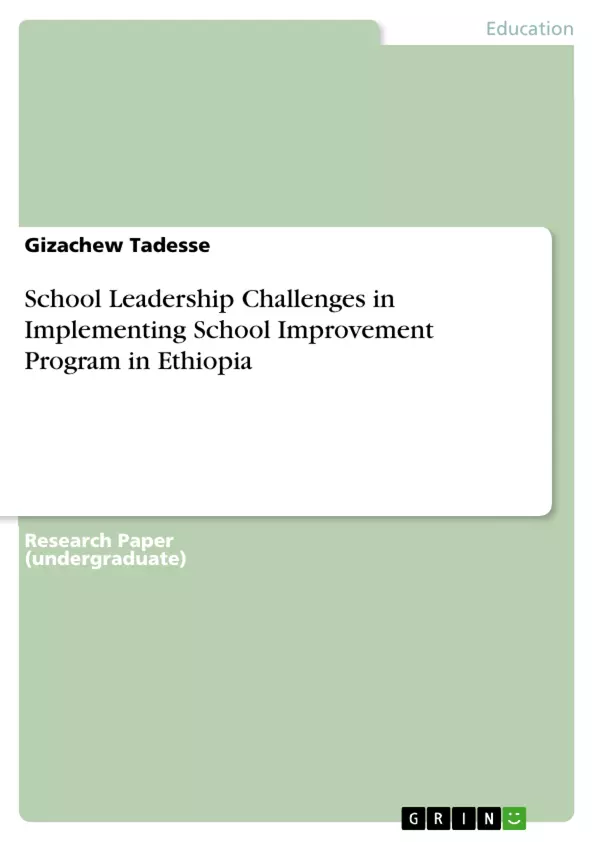This research paper focuses on the challenges faced by school leaders in implementing school improvement programs in Ethiopia. The study aims to shed light on the importance of effective leadership in promoting educational advancement and achieving national development goals. The research methodology employed both quantitative and qualitative data analyzing methods or mixed approach is use and data analysis to examine the various dimensions of school leadership and the obstacles encountered in implementing improvement programs.
The background of the study highlights the significance of education as a catalyst for economic and social growth. It emphasizes the role of education in enhancing individuals' capabilities and contributing to overall national development. Effective educational leadership is identified as a critical factor in improving learning outcomes and school performance. The Ethiopian government's emphasis on school improvement programs underscores the need for strong leadership to ensure the quality and efficiency of education at all levels.
The literature review explores key concepts such as leadership, school leadership, school improvement, and leadership roles in educational institutions. It discusses the challenges faced by school leaders in implementing improvement programs and highlights the importance of leadership skills and effective management in driving positive change.
The research findings reveal the specific challenges encountered by school leaders in Ethiopia's educational context. These challenges include inadequate leadership at the school level, insufficient training and professional development opportunities for principals. The study emphasizes the crucial role of school leaders in enhancing teaching and learning quality and highlights the importance of their capacity-building and support.
In conclusion, effective school leadership is essential for improving the efficiency and equity of education. School leaders play a pivotal role in driving school improvement and student achievement. The study provides recommendations for addressing the challenges identified, such as investing in leadership training and professional development programs, fostering collaborative learning environments, and promoting evidence-based decision-making.
Overall, this research contributes to the understanding of school leadership challenges in implementing school improvement programs in Ethiopia. It underscores the importance of effective
Inhaltsverzeichnis (Table of Contents)
- Chapter 1
- Background of the Study
- Statement of the Problem
- Objective of the Study
- General Objective
- Specific Objectives of the Study
- Scope and Limitation of the Study
- Importance of the Study
- Key Terms
- Organization of the Study
- Chapter 2
- Literature Review
- The Concepts of leadership, School Leadership and School Improvement
- Leadership Skills
- School Leadership and Management
- Leadership Roles on School Improvement
- Challenges of School Leaders in School Improvement Program
- Chapter 3
- Research Methodology
- Research design
- Research Approach
- Sampling Method and Procedure
- Methods of Data Analysis
- Sources of Data
- Chapter 4
- Data Presentation, Analysis, and Discussion
- School Leadership Challenges in Implementing School Improvement Program
- Chapter 5
- Conclusion
- Summary
- Recommendations
Zielsetzung und Themenschwerpunkte (Objectives and Key Themes)
The research aims to investigate the challenges school leaders in Ethiopia face when implementing school improvement programs. It examines the impact of leadership on educational quality and explores the potential for enhancing leadership capacity to facilitate effective program implementation.
- The role of school leadership in improving educational quality and student outcomes.
- The challenges faced by school leaders in implementing school improvement programs in Ethiopia.
- The impact of leadership styles and practices on school improvement initiatives.
- The importance of stakeholder involvement and collaboration in school improvement efforts.
- Strategies for enhancing leadership capacity and addressing challenges in implementing school improvement programs.
Zusammenfassung der Kapitel (Chapter Summaries)
Chapter 1 provides a background on the study by discussing the importance of education in national development and the role of effective leadership in improving educational quality. It outlines the statement of the problem, objectives, scope, and significance of the research. Chapter 2 delves into the existing literature on leadership, school leadership, and school improvement, exploring various concepts, skills, and challenges related to effective school leadership. Chapter 3 outlines the research methodology employed, including the research design, approach, sampling methods, and data analysis techniques used in the study. Chapter 4 presents the data analysis and discussion of findings, focusing on the identified challenges faced by school leaders in implementing school improvement programs in Ethiopia.
Schlüsselwörter (Keywords)
School leadership, school improvement, educational quality, Ethiopia, leadership challenges, leadership capacity, stakeholder involvement, program implementation, student outcomes, research methodology.
- Quote paper
- Gizachew Tadesse (Author), 2023, School Leadership Challenges in Implementing School Improvement Program in Ethiopia, Munich, GRIN Verlag, https://www.hausarbeiten.de/document/1436214


